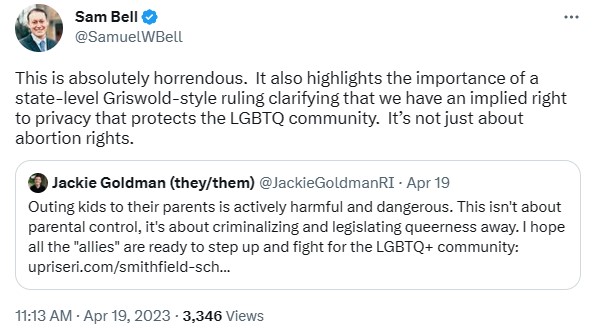
What is the alternative to schools’ “outing kids to their parents”?
It remains to be seen whether progressives have taken their radicalism a bridge too far with the aggressive push on the trans issue. Sentiments like the following tweet from Sam Bell, a far-left Democrat state senator from Providence, probably read like commentary from a bizarro world to most parents (or anybody with a tendency to think things through):

First, let’s get some context. At the end of the thread of links is an article by radical writer Steve Ahlquist (who does not have children of his own, I don’t believe) objecting to a proposal in the Smithfield School Committee that would curtail the district’s policy of lying to parents when their minor children express doubts about their sexual identities. (Even the notion of small children talking about a “sexual identity” will strike many ears as odd.) Ahlquist correctly notes that this adjustment would be contrary to the state Department of Education’s encouragement of schools to have policies of deception. This statewide guidance, alone, ought to be enough to persuade parents of the danger of entrusting their children to government-run schools.
Naturally, when I expressed a contrary opinion, one of Bell’s followers took the accusatory tack of implying that any parents who don’t go along with the radicalism must be suspicious on the grounds that their children find them untrustworthy. Such responses expose two important problems with this entire way of conceptualizing schools and parental rights.
Primarily, it’s simplistic, aggressive, and manipulative. Good parents want to know when important and, especially, unexpected behaviors crop up in their children, and the progressives’ view could apply to anything. If your child is getting bad grades, showing evidence of getting involved with drugs, or anything else that kids tend to hide from their parents, the radicals could just as easily blame the parents for the insinuated lack of trust in that area. Schools are supposed to work collaboratively with parents to catch and correct such developments, and schools are supposed to take a subsidiary place to them. It is parents’ role to determine whether the other adults with whom their children interact are trustworthy, not the other way around.
Even parents who believe their children will trust them with every secret should reevaluate their views if they think schools should have the authority to lie to other parents of whom they don’t approve. The radicals’ policies lump all parents under a cloud of suspicion characterized by the worst parent they can imagine; you’re not exempt from that condemnation just because you think you’re a good person.
A more-practical point too often missed is that it is insufficient simply to assert that some parents might not react the way well-meaning people would prefer when they receive information about their children. We have to evaluate the alternative. In this case, the alternative is moving the school to the primary position of authority, empowered to evaluate the parents. This can’t be done in the abstract, and it can’t posit the ideal schoolteacher and administration as the hypothetical alternative to the worst possible parent.
Indeed, if we promote policies that give school employees a maximal amount of trust — giving them social approval and legal support to lie to parents about matters of sexuality — we’re creating a gigantic magnet for precisely the sort of predators from whom we should protect children. Ideological predators belong on the watchlist in addition to sexual predators.
As with everything involving public schools, take careful note of the lack in accountability. What safeguards are there for these lie-to-parents policies? What consequences are there for teachers, counsellors, and administrators who make calamitous decisions in these sensitive areas? None and none. Intrinsically, parents can have no ability to appeal or seek other opinions when the government agency is actively hiding the truth from them.
We can tell the motivation isn’t ultimately the well-being of children because of the vagueness and carelessness of the plans. If the radicals were serious, they’d propose comprehensive safeguards, with many levels of approval and outside review. They’d include strong consequences for any of the professionals who negligently make mistakes. They don’t even attempt it. The radicals aren’t serious; they’re just radical.
Thus, we can conclude that they don’t care how many children or families they harm. The issue isn’t the issue; the revolution is the issue.
Featured image from Shutterstock.
